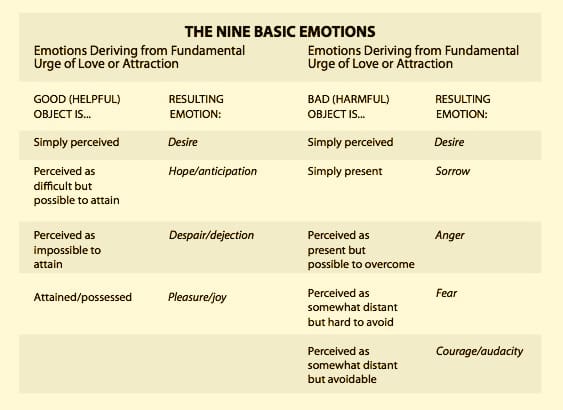Editor’s Note: In Part I, we examined the gift that the emotions are and the categories of emotions. Today we will look at the nine most basic emotions and an example of emotion in action. Here is the question we are considering:
Dear Father John, I’m not usually an emotional person. But sometimes, I can get very angry. And, sometimes I am so moved by something at Mass, it brings me to tears. I know we are not supposed to be attached to things. It seems that the more attached I am to something or someone, the more emotional I get. So, are these emotions bad? Can you help me understand these things called emotions?
The Nine Most Basic Emotions
The nine basic emotions flow from the two contrary, foundational urges of our embodied human nature, which Christian philosophy labels love and hate. At their most fundamental level, these urges are connected to our senses and our bodies, and they are morally neutral; they are simple, emotional reactions to exterior stimuli; they are spontaneous feelings of love and hate without any moral decision to love or hate. Certain things in the world are good for us, and the urge of love, or attraction, kicks into gear when we come into contact with those things. Certain other things in the world are bad for us, and the urge of hate, or repulsion, kicks into gear when we come into contact with those things.
The experience of attraction stirs up four of the nine basic emotions. When we perceive something that would be good for us, we feel a desire for it. Desire–this is the first basic emotion. When that good, desirable thing seems as if it will be hard to acquire, but we think that if we make an effort, we  will indeed acquire it, we feel the basic emotion of hope (the feeling, not the virtue). If the good, desirable thing seems impossible to acquire, we experience a feeling of despair, discouragement, or hopelessness (again, just the feeling, not the sin). When we actually acquire the good, desirable thing and are enjoying it, we feel pleasure, the fourth emotion connected to the urge of attraction. The experience of repulsion stirs up the other five basic emotions. If we perceive something that will harm us, some evil thing, we feel the basic emotion of aversion, or revulsion. If that hateful thing actually comes upon us or happens to us, we feel sorrow or pain. If it comes upon us and we judge that by resisting we can actually get rid of it, we feel anger (the emotion, not the sin). If the hateful thing is out there somewhere and seems hard for us to avoid, we experience fear. If the hateful thing out there seems hard to avoid, but we judge that we can indeed avoid or eliminate it, we experience feelings of courage or audacity.
will indeed acquire it, we feel the basic emotion of hope (the feeling, not the virtue). If the good, desirable thing seems impossible to acquire, we experience a feeling of despair, discouragement, or hopelessness (again, just the feeling, not the sin). When we actually acquire the good, desirable thing and are enjoying it, we feel pleasure, the fourth emotion connected to the urge of attraction. The experience of repulsion stirs up the other five basic emotions. If we perceive something that will harm us, some evil thing, we feel the basic emotion of aversion, or revulsion. If that hateful thing actually comes upon us or happens to us, we feel sorrow or pain. If it comes upon us and we judge that by resisting we can actually get rid of it, we feel anger (the emotion, not the sin). If the hateful thing is out there somewhere and seems hard for us to avoid, we experience fear. If the hateful thing out there seems hard to avoid, but we judge that we can indeed avoid or eliminate it, we experience feelings of courage or audacity.
Emotion in Action
 A few simple examples will help clarify. If I am hungry and I see a ripe apple in the fruit basket (and if I like apples), I will feel desire–the good, desirable apple is perceived as something that will help me. If the last time I took that kind of apple out of that particular basket, it had a big, fat worm in it, I may feel revulsion when I see that apple, which by association I perceive as something that may harm me. If I am penniless and hungry and see a basketful of apples at the store, I may feel hope if there is some way I can get enough money to buy one, and I may feel despair if I can’t think of any way to get any money. If I get the money and I am on the way to the store, and someone much bigger than me knocks me down and steals the money, I will feel sorrow. If I get some more money and make my way back to the store, and while I am walking along I see the same thief staring at me from across the street, I may feel fear. If I make it to the store and offer my money to the clerk, and am told I need more than that to buy the apple, I may feel anger and courageously start to argue with the clerk, pointing out that, according to the price tag, I have the right amount. This is a simple profile of human emotions, a good starting place for reflection on how God wants us to integrate emotions fully into our relationship with him.
A few simple examples will help clarify. If I am hungry and I see a ripe apple in the fruit basket (and if I like apples), I will feel desire–the good, desirable apple is perceived as something that will help me. If the last time I took that kind of apple out of that particular basket, it had a big, fat worm in it, I may feel revulsion when I see that apple, which by association I perceive as something that may harm me. If I am penniless and hungry and see a basketful of apples at the store, I may feel hope if there is some way I can get enough money to buy one, and I may feel despair if I can’t think of any way to get any money. If I get the money and I am on the way to the store, and someone much bigger than me knocks me down and steals the money, I will feel sorrow. If I get some more money and make my way back to the store, and while I am walking along I see the same thief staring at me from across the street, I may feel fear. If I make it to the store and offer my money to the clerk, and am told I need more than that to buy the apple, I may feel anger and courageously start to argue with the clerk, pointing out that, according to the price tag, I have the right amount. This is a simple profile of human emotions, a good starting place for reflection on how God wants us to integrate emotions fully into our relationship with him.
Editor’s Note: This is another excerpt from Father John Bartunek’s new book “Seeking First the Kingdom” filled with “practical examples and down-to-earth wisdom which will show you how to bring Christ into each facet of your life”. Click here to learn more about the book…or if you wish to get it for a friend or relative who doesn’t read on line.



